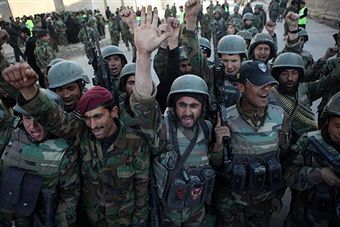 Many will claim that the Taliban’s recent attack in Kabul shows how powerful the insurgency has become. No doubt the psychological impact – the real aim of all terrorists – will be felt for some time. Faroshga market, one of the city’s most popular shopping malls, lay in ruins and the normally bustling streets of Kabul emptied.
Many will claim that the Taliban’s recent attack in Kabul shows how powerful the insurgency has become. No doubt the psychological impact – the real aim of all terrorists – will be felt for some time. Faroshga market, one of the city’s most popular shopping malls, lay in ruins and the normally bustling streets of Kabul emptied.
But the attack was an operational failure. All seven militants died in the attack; five were gunned down and two killed themselves. Three soldiers and two civilians — including one child — were killed. Seventy-one others were injured, including 35 civilians, but the majority are only slightly wounded. Such a toll must frustrate the Taliban’s leaders, watching the event from afar. Like previous attacks in Kabul, the local security forces seemed to have acted professionally and courageously. Compared to the Mumbai attack or even their previous commando-style raid on the Serena hotel, this attack was unimpressive.
It is more likely that the Taliban has been feeling the pressure and are on the defensive. The US, streaming soldiers into the south, will take the fight to the Taliban and aim to hold territory. The Karzai government, meanwhile, has begun talking up lavish new incentives of jobs and training for defectors. The world’s attention has moved on, first to Copenhagen and now Haiti. If there is one thing terrorists hate, truly hate, it is to be forgotten. What better way to remind the world that they exist than to strike in Kabul?
True to form, “analysts” rushed to the TV studios, like Peter Mandelson defending Gordon Brown against the latest coup, to hype the event. TIME Magazine got Brahma Chellaney, a New Delhi analyst, to say the attack “makes a mockery of the plan [for reaching out to insurgents].”
Really? To me it makes it all the more relevant.
Now, there is a lot wrong with NATO’s strategy, but the recent violence shows that the Taliban are, at least for now, feeling squeezed. The West should push home the advantage it has. That means ensuring that the upcoming London conference has one aim: to help Hamid Karzai begin reaching out to insurgents and fence-sitters, drawing them into a negotiation that can drain the insurgency of all but the religiously-committed warriors.






Comments